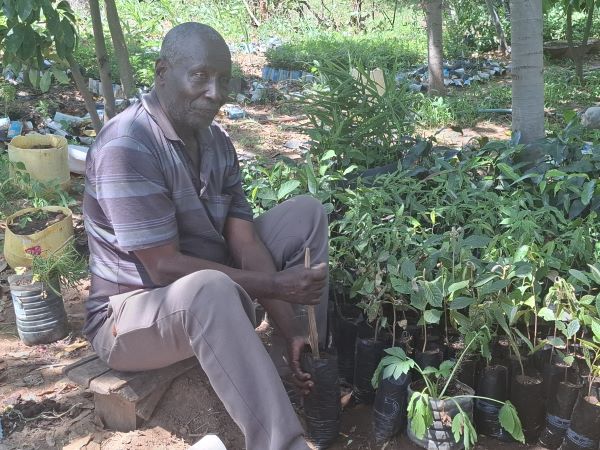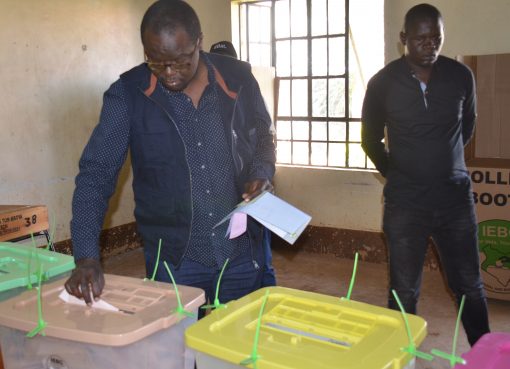Communities in Ukambani have actively adopting climate-smart agriculture to mitigate the effects of global warming through tree planting and conservation initiative
The communities in Kivaa ward in Masinga Sub County, Machakos County have embarked on awareness campaign to propagate climate change adaptation strategies to various groups to mobilize residents to restore the degraded forest cover slowly by slowly.
Via-Mweki (Pamoja Kabisa) community group comprising more than 100 residents has been working with organizations such as the Institute for Culture and Ecology (ICE) to conserve and restore the land around the Kivaa hill.
Luka Kioko, chairperson of the Via Mweki Community Based Organization(CBO) made up of 10 groups says Kivaa hill is and has been critical to the local residents due to its value as a hub of medicinal plants, indigenous trees and a home to various sanctuaries used to appease their gods.
According to Kioko, the group which started way back in 2008 has been looking at the Kivaa hill being destroyed leaving it bear with no tree cover and therefore denying the locals the rains that they rely on for their livelihoods and agriculture practices.
“The Indigenous Trees that were at Kivaa hill were all lost due to increased grazing, farming, charcoal burning and logging and this saw the forest experience massive destruction.
Kioko says Via Mweki has been embarking on numerous campaigns in restoring the hill by planting Indigenous trees around the hill and looking after them to ensure they sprout and grow and this they have been doing with the help of ICE which has been distributing indigenous trees to the groups
“We engage in restoring the degraded Kivaa Hills, by utilizing traditional knowledge and cultural practices to reforest the area, protect sacred sites, and implement sustainable land management strategies, aiming to restore the ecological balance of the hill while preserving our cultural heritage”, he told the writer.
He explained that Kivaa hill which is considered a sacred area sees the community conduct some rituals to appease the gods normally older men who are also custodians of the forest by going to the hill once a year and even slaughter a goat in a practice known as “Ithembo”.

Josephine Nzioka, also a member of the Via Mweki group said that personally she has benefited with trainings and capacity buildings in the group that has seen her grow indigenous trees in her homestead and also using agro ecology farming in planting crops that do not require a lot of rain and are good for the area.
“ As women , we are the most affected by the impacts of climate change but after joining the group and having embraced what we learnt from various trainings we can walk with our heads high as we are self-reliant as we earn money from conserving our lands, planting proper food but also planting trees that we also sell”, she added
Martin Muriuki, the Executive Director of ICE said they have been working with communities in Kivaa area to boost their economic status and promote food security as well as in conservation by donating indigenous trees and seeds,
“Growing of indigenous food varieties among them beans, sorghum, wheat, and pumpkin among others has been key to ICE conservation agenda in the area to cushion communities against climate change and promote resilience since these crops are known for their ability to adapt to the changing climate.
The biggest challenge in the area, Muriuki acknowledged has been environmental degradation and that planting trees both in the forest and at their farms for agroforestry
“This has worked well and the trees that we have been planting are now big trees and one can see the transformation not only at the farm level but also around the Kivaa hills”, he said
Muriuki noted that supporting the community to understand the essence of protecting and recovering their indigenous culture has sensibility within them and also having a venue for their meetings that was built for them by the African biodiversity Network they are organized.

The Director said there is a need for Counties to develop policies that protect the culture of the people not only for the communities in Machakos but for a while.
“These policies must be planned around resilience, climate forestry, environment, natural resource management and even and agriculture”, Muriuki said
Agro ecological approaches use natural processes to optimize the interactions between plants, animal’s humans and the environment while taking into consideration local and scientific knowledge.
For the Kivaa Community climate change and conservation efforts can help them adapt and also empower them as key agents of change when it comes to addressing food security in the country.
The Institute for Culture and Ecology (ICE) is a partner of the African Biodiversity Network (ABN), collaborating in building resilient communities in Kenya.
By Wangari Ndirangu




